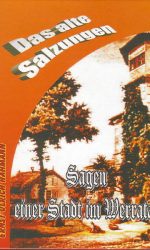Description
From the media:
At the 14. August 2024 The new volume of the Nordhausen “Yellow Series” was published with the title “Nordhausen at the Reichshofrat / “Regesten”. Author Dr. Kevin Hecken and editor Dr. Stephan Wendehorst (University of Vienna) presented the work as part of the public book presentation Nordhausen vor. Foundation board member Dr. In his welcoming speech, Helge Wittmann acknowledged the scientific work carried out and highlighted its high importance for the history of the city of Nordhausen. The volume documents the results of the development project made possible by the Friedrich Christian Lesser Foundation on the Nordhausen legal disputes before the Vienna Reichshofrat from the middle of the year 16. century to 1802. The book was published by the publisher Iffland Nordhausen.
From the book:
190 They are documents, which the present volume brings into reggest form and with it, apart from the files already recorded by colleagues in the Göttingen project in recent years, accessible to a wider public for the first time. Each of these procedures contains a request for the granting of favor, of mercy or of justice, that of the Roman Emperor as head of the Holy Roman Empire, as the supreme feudal lord and guardian of the law, not just expected, but could be applied for formally. This was particularly true for the residents of cities like Nordhausen, the only one for him, the emperor, and not subject to any of the princes surrounding the walls, who were therefore 'immediate to the Reich'. In this sense it can be called emblematic, that in the Nordhausen Reichshofrat proceedings there were privileges and mandates from Heinrich the Vogler († 936, No.. 189) up to Francis II. († 1835, No.. 99) find, from the first to the last lord of the Holy Roman Empire and thus testimonies from over 800 years of German fiefdom, dominion- and administrative history. Die Institution, through which the emperor entered into social relations with the empire in this way, was - among other things - the Reichshofrat, whose main tasks are, on the one hand, jurisprudence, on the other hand, there was the satisfaction of gratuitous and feudal needs. That it is, at least in principle, under certain circumstances, even the lowest of the emperor's subjects was free to do so, to prosecute even the most powerful in the empire, that this opportunity was also available to legally marginalized groups such as women or Jews and that ultimately, like a six-digit number of documents in the house, Court- and Vienna State Archives, also happened, is one of the 'modern' characteristics of the Holy Roman Empire that is all too often underestimated, especially in international comparison, the still the from the 19. Century inherited image of an inflexible, attached to an ossified structure that is incapable of reform. 190 Files mean at the same time 190 Insights into the Nordhausen society of their day, in the actions of the key actors, the most significant problems, the most serious conflicts of their time. At the same time, however, they open up a window into the small world for the modern viewer, everyday difficulties of rich and poor, Established and precarious, Young and old. What anger may have welled up in the city's craftsmen, because the Prussian city mayor tried to open the way for the son of a simple pig cutter to join one of the renowned council guilds? How should a pharmacist live?, the one who had his lease canceled by the city and the one with children and children, his medication and was literally put on the street? How might the city's senators have felt?, as they looked with concern at the empty city coffers and the empty council beer hall, while the canons of the Holy Cross Monastery do the business of their lives day after day in the crowded drinking rooms of their monastery houses, because they are exempt from the grinding penny, made beer? These and many other perspectives are opened up by studying the Nordhausen procedures. At the same time, they provide an opportunity for psycho- and sociograms: In them we encounter unique personalities, like the controversial mayor Johann Andreas Sigismund Wilde, who covered the city with lawsuits at the Reichskammergericht and Reichshofrat on a massive scale, that even the otherwise sober Hans Silberborth almost stopped him 100 I had to refer to him as a 'Prozeßhansl' for years. ….






Reviews
There are no reviews yet.